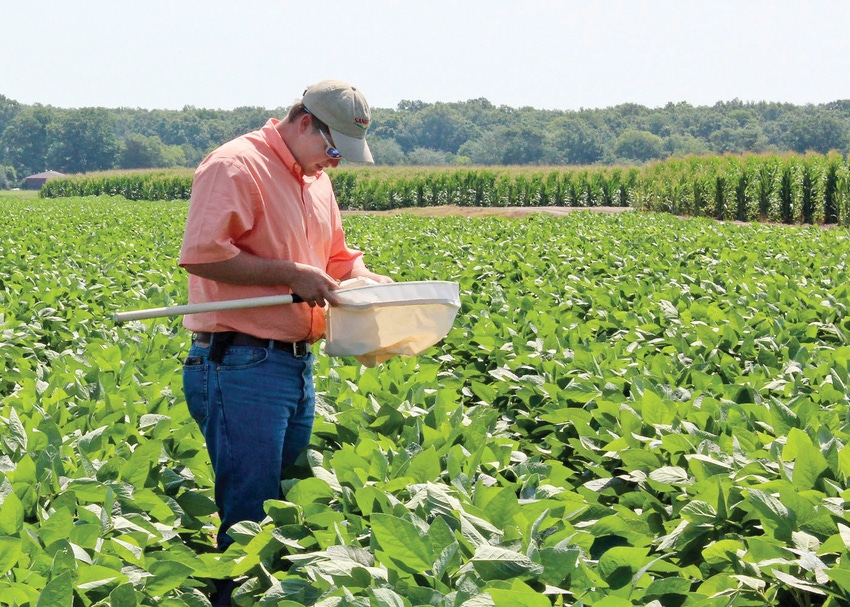
MSU student farms during Sanders internship
James Locke of Greenwood, Miss., operates Locke Farms on 18 acres of his grandparents’ land, and has grown popular fruits and vegetables for sale locally. In March, while waiting to hear if he had been accepted into any internship programs, he planted more acres in field corn than he usually does, just in case he did not have as much time to farm fresh produce this summer.
July 10, 2012

While some college students struck out in their employment searches this summer, one Mississippi State University student has two full-time jobs.
“I’ve been working from sunup to sundown every summer since I was 14, and this summer I’m farming and interning,” said James Locke, an MSU senior majoring in agriculture science. “School feels like a vacation to me.”
Locke, of Greenwood, operates Locke Farms on 18 acres of his grandparents’ land, and has grown popular fruits and vegetables for sale locally. In March, while waiting to hear if he had been accepted into any internship programs, he planted more acres in field corn than he usually does, just in case he did not have as much time to farm fresh produce this summer.
“Field corn is not as labor intensive as some of the other produce I grow.I’ve already sold most of my corn crop to the grain elevator,” he said in mid-June.
His gamble paid off when Jimmy Sanders, Inc., selected him to become one of 18 MSU student interns working in six states this summer.
Terry Brown, a certified crop adviser in the sales division of Jimmy Sanders, Inc., a Cleveland, Miss.-based agricultural input supply and distribution business, said he feels fortunate Locke was assigned as an intern in Tchula, a small Delta town in Holmes County.
“Sanders enjoys selecting these young people to come into their system, training them and helping them see if this is the kind of work they’d like to do,” he said. “James has a tremendous agricultural background and has sold vegetables since he was a young teen to put himself through school. I worked with him before he was an intern — selling him fertilizers and chemicals for his truck crops. James is smart, he has a good personality and he’s inquisitive.”
Brown said Locke is currently learning about the Optigro program, which uses GPS information to apply variable rates of fertilizer based on soil samples.
“He’s gone with us to map fields, take soil samples and determine the fertilizer rates so growers save money and are more efficient with their inputs,” Brown said. “He’s also been in the field with our other sales reps learning to check soybeans and corn, and he’s asking a lot of questions.”
In addition to the paid job experience, Locke receives six credit hours at MSU for the internship.
“I couldn’t turn down this opportunity, even though it meant changing my truck crop production and having more work in the evenings and weekends,” Locke said. “I’m busy, but I really like it.”
Locke is certainly not new to the business of farming. After growing an oversized garden one summer and giving away most of the produce, he decided to plant on a larger scale and treat farming as a summer job.
He took his produce to the farmers’ market and sold it out of the back of his truck. Soon customers were coming to the farm to purchase fresh produce and expecting to see him every week.
“I have a lot of older customers who can’t get out and garden like they used to, but they love fresh produce,” he said.
Locke’s sweet corn, tomatoes, peas, butter beans, watermelon and cantaloupe are in high demand.
Locke also pursued less conventional ways of making his operation profitable. During last summer’s Texas drought, he sold more than 300 rolls of hay over the Internet through Mississippi Market Maker. He received a young farmer’s grant from the Natural Resources Conservation Service/Farm Service Agency to share the cost of putting in an irrigation well.
“Usually farming is a steady cycle of checking for bugs, watering, spraying, harvesting while it’s cool, working until dark, calling customers and delivering,” he said. “On the weekends when everyone else is going to the lake, a farmer still has to work because if the crop is ready, you have to harvest or it will ruin. You take off for two or three days, and you’ve lost a lot of product and money — you just can’t do it.
“So this summer while I’m interning throughout the week, I’m squeezing in farming in the evenings and on weekends,” he said.
You May Also Like



